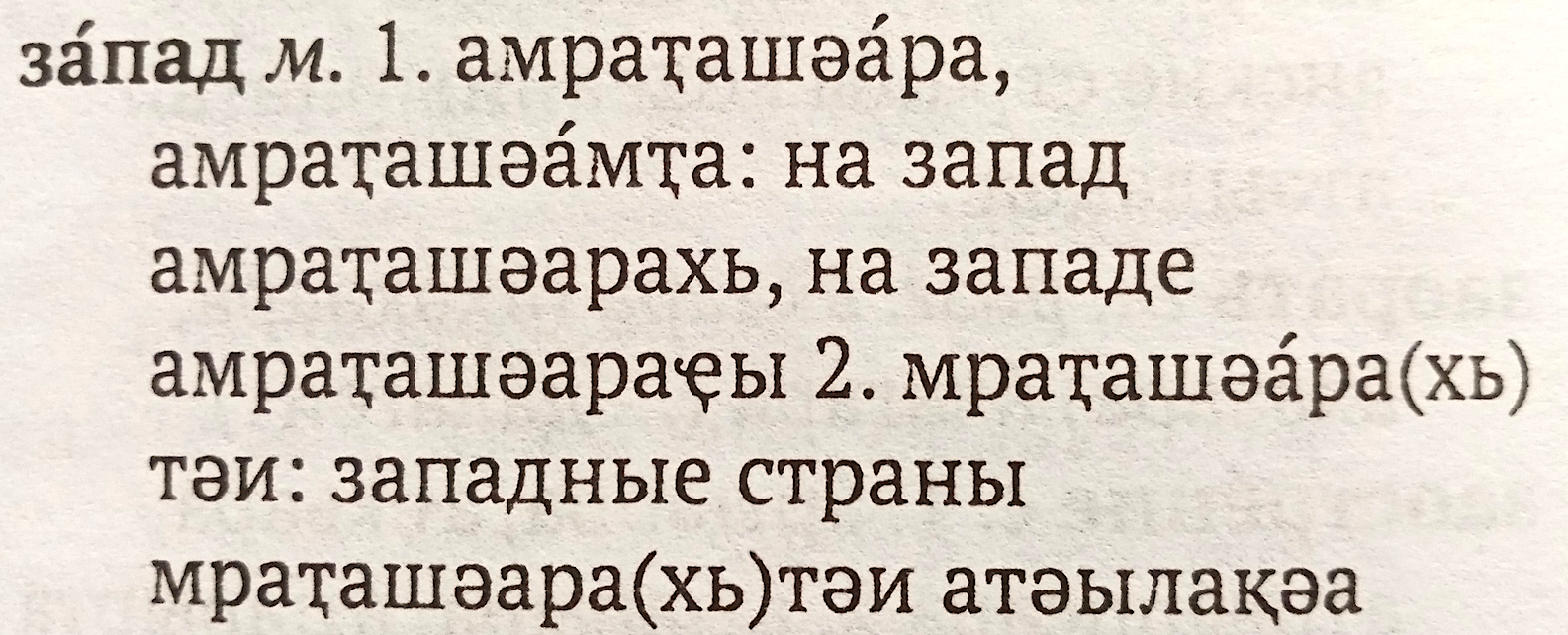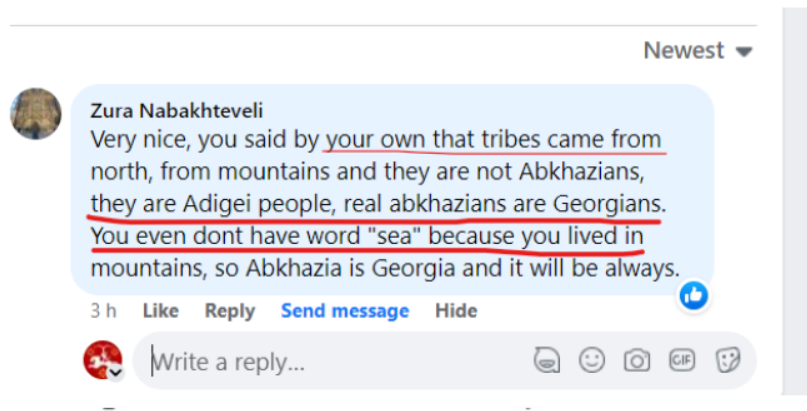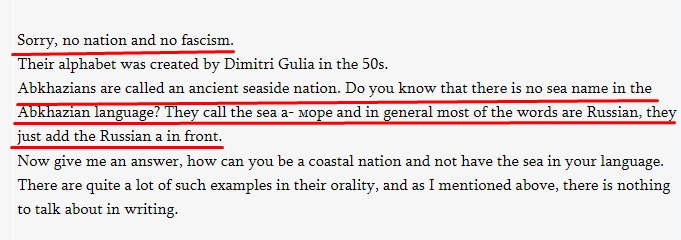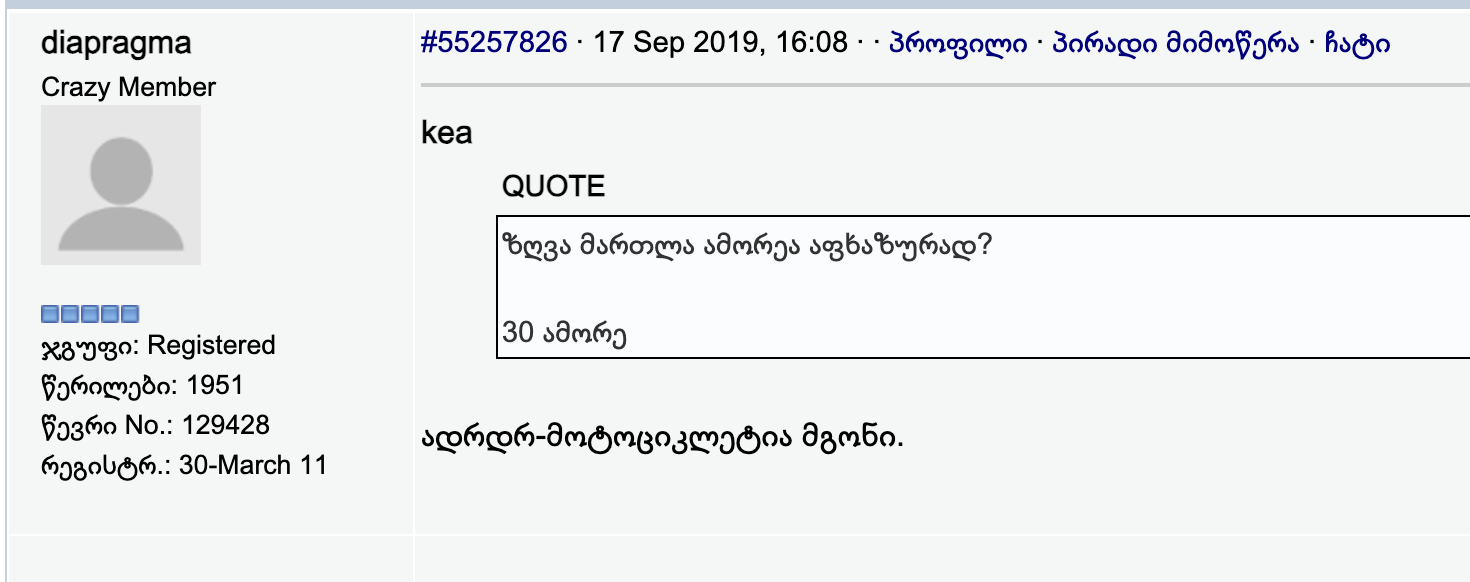Exposing Ignorance: Navigating the Sea of Deceptions

Chauvinism is not the product of a well-nourished nationalism but a poor substitute.
Numerous myths about Abkhaz history and culture are widely accepted in Georgian society. These myths range from the belief that 'the Abkhaz were originally a Georgian tribe', to claims that 'the Abkhaz are not indigenous to the region', and assertions that 'there are no Abkhaz names in Abkhazia' and among many others. Despite the ease with which these myths can be debunked, many choose not to engage in research, perpetuating these falsehoods instead.
On the 27th of October, during the celebration of the Day of the Abkhaz Language, these habits were once again evident. Numerous Georgians took to social media to post sarcastic comments under posts commemorating the day, belittling the Abkhaz language and culture. Some even reiterated a long-standing myth, asserting: "There is no word for 'sea' in Abkhaz."
More examples of such comments can be found at the bottom of this page.
It is frustrating to have to respond to such topics and take these individuals seriously, but by providing an explanation for something so frequently repeated, perhaps we can encourage these ignorant, chauvinist people to seek out the truth for themselves.
Those labouring under the misapprehension that Abkhaz has no word for 'sea' might like to note the entry in (the Georgian) Temur Gvantseladze's ქართულ-აფხაზური ლექსიკონი (Georgian-Abkhaz Dictionary) of 2019 on p. 67:
, which reads: zghva ax'dz. ámʂən, ága (where the 1st word is Georgian for 'sea', followed in italics by the abbreviated Abkhaz word for 'noun'], and then two equivalents are presented – regrettably, the stress on the first (more usual) equivalent is incorrectly assigned, as it falls on the second syllable. It should also be instructive to note the Abkhaz word for 'west', as presented in volume I of Boris Dzhonua's 'Russian-Abkhaz Dictionary' (2012/16), namely:
, where we are primarily concerned with the analysis of the first word (viz. /amrataʃwára/). Here /a.mra-/ means 'the.sun'; /-ta-/ is a preverb meaning 'into'; /-ʃwá-/ is the verbal root 'fall', whilst /-ra/ marks the gerund/verbal noun/masdar. Thus, 'west' is conceived as 'the falling of the sun into', and what, dear reader, do you imagine the sun is seen as falling into by a coastal-dwelling community other than the SEA?
So, for those curious souls out there: 'sea' in Abkhaz is beautifully termed as 'Амшын'. The Abkhaz language is rich, boasting over 2000 sea-related words. Dive deeper, and you will unearth nautical gems such as 'Аԥсыӡ' (fish), 'аихасаҟәа' (raft), 'ашхәа' (boat), 'афлыка' (felucca), 'аӷба' (ship), 'азандал' (another word for ship), 'амызгәыҭ' (mast), 'аԥра' (sail), 'аԥсҟы' (ship's wheel), 'аԥсры' (ship's hold), 'ахыгәра' (deck), and many more...
The roots of education are bitter, but the fruit is sweet.
The richness of Abkhaz's maritime vocabulary is a testament to its unique and vibrant connection with the sea, offering a clear refutation of the misguided myths that continue to circulate. Let us strive for understanding and respect, embracing the diversity of languages and cultures that enrich our world.
"Our society thinks that Abkhaz language does not have words – “sea” and “boat.” People assume that Abkhaz people settled on the seashore short time ago since they did not know corresponding words. I do not know who created this false “argument” but simple logic dictates to us that people, who have lived on the seashore at least for several years, will have word “sea” in its language. As for Abkhaz people, they have been living on the seashore from the ancient time and their language is rich with corresponding terms. Like other inhabitants of the seashore, Abkhaz people ran sea-industry and piracy. They sailed long distances. Dutch scientist Nikolas Witsen wrote about Abkhaz pirates in 1692 who sometimes blocked the sailing of ships between Kapa (Crimea) and Constantinople. Vakhushti Batonishvili (XVIII) also wrote that Abkhaz people were “strong and powerful in the sea.” There are a lot of similar documents in the history. In parallel to the sailing, Abkhaz people ran shipbuilding too which existed before the second half of the XIX century. Abkhaz ships placed about 100 men and were equipped with small cannons. However, they could build bigger ships too. There is a document that in 1802 the ruler of Abkhazia Kelesh-Beg gifted a ship with 60 cannons to Osman [Ottoman -ed] Sultan which was built in his country."
― from the interview with Prof. Georgy Anchabadze [Achba] (HumanRights.ge)
"As for Abkhazia, no one questioned the presence of ethnolinguistically Abkhazian tribes along the eastern Black Sea coast since ancient times, a belief reinforced by references in Pliny the Elder, Arrian and other Greek and Roman sources to tribes whose names contained the roots Abasg-/Abask- and Apsil-/ Absil- (cf. the modern ethnonyms Abaza and Apsua, the self-designation of the Abkhazians).43 Furthermore, Janašia (1940) found what he interpreted as evidence of an Abkhaz-Adyghean substrate both within the borders of modern day Abkhazia and further south and east in what is now Georgian-speaking territory. Among the toponymic elements of Northwest Caucasian origin identified by Janašia were the suffixes -ps-/-pš-, meaning “water, river” and -q’va “valley”. River names including these elements are found as far south as Guria (Supsa) and Ach’aria (Ač’q’va). The hypothesis that Abkhaz-Adyghean speakers were among the ancient inhabitants of western Georgia received the support of Marr (1930) and Čikobava (1948: 263), and indeed is compatible with the supposition, expressed by Javaxišvili (1960: 401–417) and Kavtaradze (1985), that the remote linguistic ancestors of the Georgians came from further south."
― Kevin Tuite, "The Rise and Fall and Revival of the Ibero-Caucasian Hypothesis," Historiographia Linguistica Vol. 35:1/2 (2008), pp. 23-82 (pp. 57-58).
+ Georgian Myths vs. Historical Facts: The Reality of Abkhazian History
+ Georgian Nationalism: Fabricating History and Denying Abkhazian Identity
+ Zviad Gamsakhurdia: “Abkhaz Nation Doesn’t Exist!”
Google translation:






